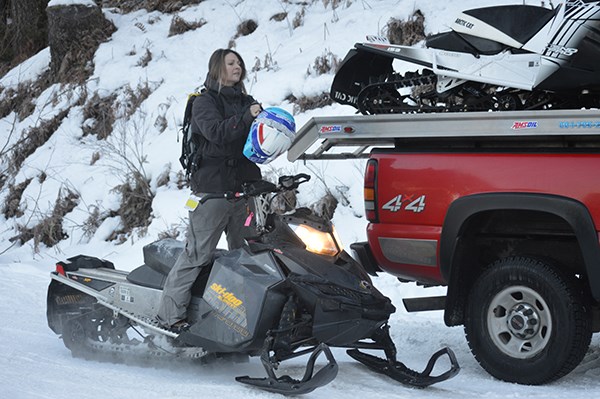Each year, the Black Tusk Snowmobile Club holds safety sessions in the Brohm Ridge and Cat Lake area.
The two-day outreach events help teach people to know what they are getting into when they enter the backcountry on their sleds and also attract new members to the club.
Squamish’s Paula de Jong was signed up for the weekend session, although she had attended one in the past.
“I’ve done it one year. I thought it was about time for a refresher,” she said.
The courses, which were held this past week, have a long tradition, but the tradition could be under threat if the proposed Garibaldi at Squamish (GAS) four-season resort proceeds, according to club members.
In the fall, a spokesperson for the developer told The Squamish Chief that the company would try to preserve as much of the natural environment as possible.
At present, all sides are waiting for a certificate decision from the province’s Environmental Assessment Office, which could be in the coming weeks.
“Hopefully, they’ll have a decision here pretty quickly,” said Sam Grant, one of the club’s directors.
Black Tusk members have been at the forefront of opposition to the resort plan, which itself has a long history of more than 40 years. Early work resulted in cabins and even towers, but plans were soon abandoned.
With some help from government grants, the club has maintained the area, including the two buildings left at the site, and the roads both for winter users like the snowmobilers and others such as dirt bike riders, who use the site in the warmer months.
“We’ve become stewards of the mountain,” said Black Tusk’s Erin Hart, who is also the president of the B.C. Snowmobiling Federation.
In the meantime, Black Tusk will go about its business, which included hosting the safety sessions on Jan. 7 and 8 and again on Jan. 9 and 10. Typically, there are 20 students in each class. The club estimates it has trained about 700 people over the years.
On Saturday, students gathered at a location off the highway, where they loaded their gear onto two snowcats, leaving them free to ride up to the training site.
The club brought in renowned avalanche educator Niko Weis to tell snowmobilers what they need to know when they are out in avalanche country.
“He’s been a partner of ours for quite a while,” Hart said.
The training takes place over two days, and the club brings in a chef to cook for the guests, who stay at the chalet overnight.
“What we’re basically offering is accommodations and meals and an alpine experience,” Hart said. “That’ll go away if the GAS thing goes through.”
Black Tusk members are now hoping that the snowmobiling area, which hosts a range of recreation activities, is not lost to surrounding development.
“There really is no good replacement area for us to go,” Hart said.
Started in 1971, the club is one of 72 around the province, and Hart emphasizes that safety is becoming even more important because of easier access into backcountry areas.
“These new sleds can take you anywhere now,” he said.



